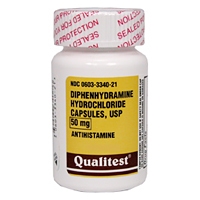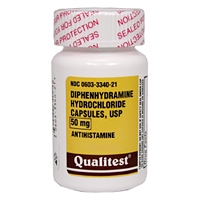Free Delivery on $50+* || Clinic Website
Providing Quality & Trust
Diphenhydramine Capsule
Teva
$0.08 - $0.12
$0.08 Each
Detailed Description
Diphenhydramine
(dye-fen-hye-dra-meen)
Description: Antihistamine
Other Names for this Medication: Benadryl®, Banophen®, Genahist®, Diphenhist®
Common Dosage Forms: Veterinary: No systemic products; shampoos, topical sprays, and topical liquids are available. Human: 12.5mg chewable tablets; 25 mg & 50 mg tablets or capsules; 12.5 mg disintegrating strips; 5 mg/mL oral suspension; 12.5 mg/5 mL oral liquid, elixir, or syrup.
Allergies cause histamine release, which causes itchy skin. Diphenhydramine blocks histamine’s effects to reduce itchiness associated with allergies. It can also be used as an additional treatment for itching related to certain types of cancers (eg, mast cell tumors). Like other antihistamines, the response to this drug can vary between animals and be unpredictable, so your veterinarian may try several different antihistamines to see which one works best for your animal. This antihistamine may be used with another antihistamine to improve its effects. Diphenhydramine may be used as a treatment or preventative for motion sickness. It is occasionally used as a tranquilizer to calm animals or to treat signs (such as tremors or rigidity) associated with certain drugs or toxins. The FDA has approved this drug for use in humans, but it is not officially approved for systemic use in animals. The FDA allows veterinarians to prescribe products containing this drug in different species or for other conditions in certain situations. You and your veterinarian can discuss why this drug is the most appropriate choice.
Side effects that usually are not serious include: The most common side effect, which is often desirable, is sleepiness. Most animals will become tolerant to this effect with time and will not get as sleepy when given the medication. Cats, in particular, may become unusually excited while taking this drug. Dry mouth and trouble urinating (eg, straining) are possible but not common. Infrequently, diphenhydramine may cause gastrointestinal distress such as vomiting, decreased appetite, or diarrhea.
You don’t have to be overly concerned if you see any of these signs unless they are severe, worsen, or continue to be a problem. Contact your veterinarian if this happens.
If you have any other questions about this medication, contact your veterinarian or pharmacist.

Powered by nopCommerce
This site is running in live payment mode. Real payments will be processed.

